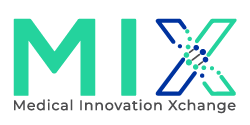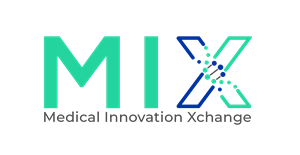A teaching lab in the heart of Waterloo Region is helping the medtech community in southwestern Ontario make great strides in their medical research. The University of Waterloo’s Human Anatomy Laboratory, which is housed in the Department of Kinesiology and Health Sciences, offers the perfect location for surgeons to test procedures on cadaver donors.
Medtech companies can connect with the School of Anatomy for their research, thanks to a collaboration with Medical Innovation Xchange (MIX), Canada’s first industry-led hub for medtech startups who want to turn prototypes into products. Through funding provided by Ontario’s Ministry of Labour, Immigration and Skills Development, MIX facilitates access at the University for researchers for lab space and equipment needed for their work.
“The idea is to get as close to a real clinical situation as we can without putting patients at risk,” says Julia Foucault, product development manager at Intellijoint Surgical, the first local company to test out the lab space. “Surgeons get hands-on time to play with our new products and see what their thoughts are.”
The partnership between MIX, and Waterloo’s Faculty of Health allows local medtech companies to focus on recruiting and training local talent. Researchers often must travel to the U.S. to perform their labs, which presents logistical and financial challenges. Now, with the support from MIX, companies can bring more people into the lab in a more cost-effective way and offer more frequent hands-on training for their products.
Intellijoint Surgical uses technological innovation to deliver better outcomes in orthopedic surgeries like hip and knee replacements. Their solutions are designed by orthopedic surgeons, for orthopedic surgeons. Foucault says having a cadaver lab in their own backyard means more people are able to learn about, and use, Intellijoint’s surgical solutions.
“We were able to get about 25 people from research and development into the lab to observe the entire process,” Foucault says. “This was especially helpful for our software developers since they often don’t get to have face time with the surgeons. It was a really unique opportunity.”
For the first lab, teams at MIX, Intellijoint and the University of Waterloo worked collaboratively to ensure they had the proper tools available in the lab space. Surgeons got hands-on experience with Intellijoint products in the lab, which was designed to mirror an operating room. “Making a resource such as the Anatomy Lab available for external partners not only makes sense from a medical training and broader social perspective, but it also contributes to one of the Faculty’s strategic priorities, which is to build external community engagement,” says Russ Tupling, Kinesiology and Health Sciences chair. “We’re excited to be involved in a project that benefits local medtech companies and surgeons, and therefore patients who require hip and knee replacements.”
A locally based research lab also means Intellijoint is able to engage with local surgeons, offering a great opportunity for their company and Waterloo Region’s medical community. “Students and surgeons are able to attend to get some exposure to a lab they would never have been able to see otherwise,” Foucault says.
With one successful lab under their belts and with the support from MIX, Intellijoint hopes to be able to continue offering the research every four months at Waterloo’s Anatomy Lab for the foreseeable future.
“We will have a lot more clinical exposure to our products as early as possible before we actually get them into the field,” Foucault says. Continued research into Intellijoint products will help people who need hip and knee replacements know the implants are positioned carefully and thoughtfully, vastly improving their quality of life. “This is a great opportunity to make sure we have the reliability in our products we’re hoping for through this lab, which offers a clinical situation,” Foucault adds.
“MIX is relentless in its support for scaling medtech companies and building a medtech ecosystem in Ontario where more companies can grow and thrive,” says Elliot Fung, MIX Executive Director. “It is our goal to help to keep our medtech companies headquartered in Ontario, helping to access and develop local talent and support economic growth. This new partnership will help more companies to succeed and support our ecosystem.”
MIX will welcome other medtech companies and researchers to participate in this lab and will continue to help companies grow and succeed right in their own back yard.
This project is a part of Ontario’s Skills Development Fund which is supported through labour market transfer agreements between the Government of Canada and the Government of Ontario.

